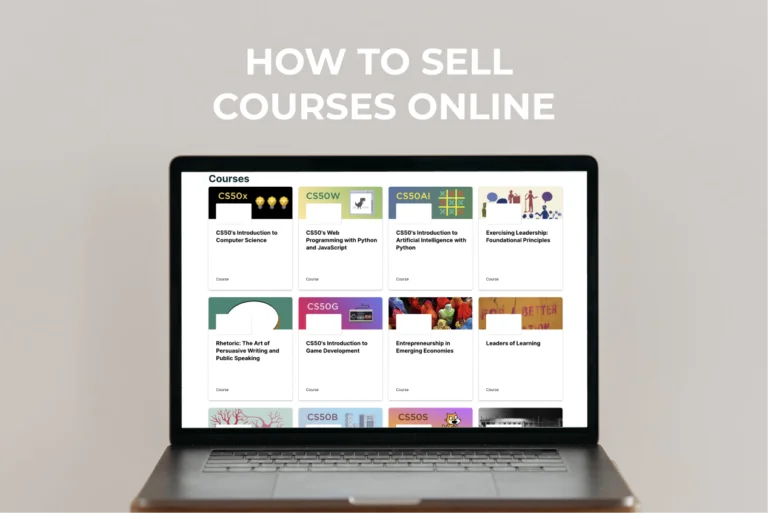How to Start a Website with Courses in 7 Essential Steps
Embark on a rewarding journey of digital education with our comprehensive guide on how to start a website with courses. From understanding your audience’s needs to crafting a compelling curriculum, and employing innovative marketing strategies, this article unveils 7 essential steps to transform your expertise into a thriving online learning hub. Discover insider tips on pricing, promotion, and post-launch support to ensure your course stands out in the competitive e-learning landscape.

How to Sell Courses Online How to Sell Courses Online
Introduction
The world’s craving more knowledge, and online courses are the answer. This isn’t just a fad — by 2026, e-learning will be a whopping $390.6 billion industry! So, what does this mean for you? Well, if you’ve ever thought, “How to start a website with courses?”, now’s your chance to dive in.
Why Create Online Courses?
- They’re booming: A steady 7.5% growth rate shows people want this digital wisdom.
- It’s profitable: Thriving online course creators are really making a mark (and a buck!).
Getting Started: What You Need
- Know Your People: Who wants to learn from you? Understanding your audience is step one.
- Pick a Winning Topic: Your course topic should be something people are hungry for.
- Quality Content is Key: From video lessons to great reading material, make sure your course content is top-notch.
Building Your Course: The Nuts and Bolts
- Choose Your Home Base: Select an online course platform that makes sense for what you’re teaching.
- Sell It: Learn the art of selling courses. It’s one thing to create it, another to get people to sign up!
Making It Shine: Beyond the Basics
- Engage: Create a course that talks WITH people, not at them. Interactive elements? Yes, please!
- Feedback is Gold: Listen to your students. Their feedback helps you grow and improve.
How to Sell Courses Online

Ever considered boosting your skills with an online course? You’re not alone! In 2024, the digital landscape is brimming with both learners and experts eager to share knowledge across various niches.
Imagine transforming your expertise into a thriving digital enterprise. It’s not just feasible; it’s practically a swipe away in today’s ever-digitalizing world.
The Knowledge Economy is Booming
The hunger for online courses is skyrocketing, and the stats are here to prove it. Come 2026, we’re looking at a global e-learning market soaring to an impressive USD 390.6 billion. Thanks to a steady 7.5% CAGR, the appeal for online content is not just a wave; it’s a surging tide.
Why the Buzz Around Online Courses?
The pandemic ushered in an e-learning boom that’s here to stay. But the prospect of building a profitable online course goes beyond financial gain. Here’s why you should consider it:
- Be Your Own Boss: Tired of the 9-5 grind? Your online course platform means you work when, where, and how you want. Plus, you keep all the earnings.
- Direct Line to Learners: Your site, your rules. Showcase course outlines, prices, reviews, and snazzy demo videos without competitor distractions.
- Expand Your Offerings: From selling online courses to eBooks or even merch, the digital space is your oyster.
- Global Audience: Why limit yourself to local when the whole world can be your classroom?
Crafting Your Online Course: A Peek Behind the Curtain Before you dive into marketing strategies, sales funnels, and captivating your target audience, it’s crucial to assess the real perks this venture offers.
Starting Your Online Course Website: The Essentials
- Identify Your Niche: Successful online courses start with a resonant topic. What can you teach, and who wants to learn it?
- Quality Content: Your course material should not just inform but also engage. Think interactive elements and practical insights.
- Choose the Right Platform: Whether it’s your own website or a popular online course marketplace, pick a spot that suits your technical skills and budget.
- Marketing Magic: Use email marketing, paid ads, and a killer sales page to draw in the crowds. Don’t forget the power of a compelling landing page!
Who Can Benefit from Creating an Online Course Platform?

Creating an online course platform isn’t just for traditional educators. Here’s a list of professionals who would significantly benefit from this digital venture:
- Coaching and Training Professionals: Those who offer personal development, career coaching, or business training services can expand their reach.
- Independent Course Providers: Individuals with expertise in any field can share their knowledge, from art and DIY to finance and technology.
- Sport Coaches: From specific sports training to general fitness regimes, coaches can provide programs, tutorials, and fitness plans.
- Fitness Instructors: Yoga, Pilates, strength training, or dance; any form of exercise can be taught online, helping people stay fit from home.
- Public Speakers: Professionals who are used to speaking at events can offer public speaking tips, leadership skills, or motivational content.
- Marketing Experts: With digital marketing ever-evolving, experts can provide courses on the latest marketing trends, SEO, social media, and more.
- Bloggers and Influencers: Those with a large following can leverage their audience to sell courses related to their niche or about building an online presence.
- Consultants and Strategists: Business, management, or IT consultants can create modules based on case studies and strategies.
- Creative Professionals: Artists, musicians, writers, and designers can teach techniques, industry insights, or business aspects of their field.
- Tech Professionals: Experts in IT, software development, or emerging tech trends can offer courses to keep professionals up-to-date in this fast-paced industry.
- Culinary Experts: Chefs or nutritionists can offer cooking classes, nutrition plans, or even wine and beverage courses.
- Mental Health Advocates: Psychologists, therapists, or mindfulness coaches can provide self-help courses, therapy sessions, or stress management techniques.
Why You Should Create Your Online Course Platform
In today’s digital-first world, it’s crucial for consulting firms, independent educators, and solo experts—including fitness instructors, public speakers, marketing gurus, and influencers—to embrace the digital landscape. Here’s why creating your own online course is a strategic move:
1. Cultivate Audience Loyalty: An online course can be a gateway for potential clients to get to know you. It’s less of a commitment than hiring a consultant, but it can lead to long-term cooperation as they experience the value of your expertise.
2. Expand Your Reach: Traditional face-to-face services are limiting. By not adapting to online education, you miss out on a global audience. Online courses break geographical barriers, inviting the world to your virtual doorstep.
3. Enhance Your Service Offering: Consulting can be niche and direct. However, an online course allows you to package your wisdom for a broader audience, showing that your practical knowledge is accessible and valuable, even to non-experts.
4. Practical and Profitable: While setting up your first online course may require effort, it’s a logical step for any business built on sharing expertise. It’s more than just another service; it’s an asset that keeps on giving.
Steps to Sell Courses Online

Embarking on the journey to sell online courses can seem daunting, but it’s entirely feasible with the right steps.
1. Carve Out Your Niche
In the realm of online courses, specificity can set you apart. Start by identifying a course topic that resonates with your expertise and passion. This isn’t just about sharing what you know; it’s about filling a gap in the educational market. Conduct thorough research to understand what potential students are seeking and what’s currently available. This insight will guide you in creating your online course that not only inform but also engage. Remember, the actual content of your course should reflect your unique perspective and approach, offering more value than what’s already out there.
2. Know Your Audience

Your course’s success hinges on its relevance to the target audience. This goes beyond identifying who might be interested; it’s about understanding their learning preferences, challenges, and goals. What course material do they find most engaging? Do they prefer video lessons, reading materials, interactive elements, or a mix? How many lessons are optimal for them to grasp the subject without feeling overwhelmed? Dive into forums, social media groups, and other online communities where your potential learners might spend time. Gather feedback through surveys or direct conversations to refine your course content, structure, and delivery methods.
3. Set Strategic Pricing
Pricing your online course can be tricky. While free courses are tempting for potential customers, they often lack the comprehensive nature and support that paid courses offer. Consider the depth and quality of your course material, the ongoing support you’ll provide, and the outcomes you’re promising. These factors should all be reflected in your price. However, don’t underestimate the power of free samples or trial periods to attract students. These strategies can give them a taste of your course’s value, encouraging them to invest in the full experience.
4. Choose the Right Software
The technical side of creating your own online course is often a hurdle for many course creators. However, with the right content management system (CMS) or learning management system (LMS), you can streamline the course creation process and manage your materials efficiently. These platforms not only host your course content but also facilitate interactive learning experiences, track student progress, and even issue course certificates upon completion. Choose a system that’s intuitive for both you and your students and supports your course’s interactivity and structure.
5. Market Your Courses

Even the most well-crafted courses can go unnoticed without effective marketing. Utilize a mix of email marketing, social media promotion, SEO, and content marketing to reach your potential clients. Create a compelling sales page and course landing page that highlights the benefits of your course, showcases testimonials, and answers common questions. Engage with your audience through regular content like blog posts, webinars, or social media updates related to your course topic. And don’t overlook the power of email marketing; it’s a potent tool for keeping your audience informed about course updates, promotions, and new content.
6. Continuous Improvement
Your first online course won’t be perfect, and that’s okay. What’s important is your commitment to gather feedback, understand your students’ experiences, and make necessary improvements. This could involve updating course content, enhancing interactivity, or adding supplementary materials. Your willingness to adapt and evolve is key to creating a thrivingonline course.
7. Legal Compliance and Quality Assurance
Maintaining high standards for your course material and ensuring it complies with relevant laws is non-negotiable. This includes respecting copyright laws, ensuring the accuracy of the information you provide, and protecting your students’ data. Additionally, offering high-quality, reliable content will establish your reputation as a trustworthy educator in the online community.
By focusing on these key areas, you’ll be well-equipped to create, launch, and maintain your online course in 2024 and beyond. Remember, the journey might be challenging, but the impact and fulfillment of educating others make it all worthwhile.
Understanding Your Audience: The Foundation of a Thriving Online Course

Embarking on the journey to create an online course requires a deep understanding of one’s audience. Identifying their pain points, aspirations, and thirst for knowledge is paramount. How do you achieve this? Surveys are a powerful tool, offering direct insights into what your audience craves in terms of content and structure. Social media isn’t just for sharing; it’s a listening tool. Engage with your potential enrollees there, understand their discussions, their needs, and their feedback. Hosting live Q&A sessions can also be incredibly revealing, providing real-time engagement and a chance to hear directly from your audience.
This foundational work isn’t just busywork; it’s what ensures your content hits the mark, striking a chord by being both relevant and deeply appealing. It’s about addressing specific needs, solving real problems, and meeting earnest expectations. Remember, an online course isn’t just about what you know; it’s about what your prospective learners need to know and how they prefer to learn. This audience-centric approach isn’t just good pedagogy; it’s good business.
Crafting a Compelling Course Curriculum

Understanding the Essentials
When you set out to create an online course, the curriculum isn’t just about what you teach; it’s about how you deliver your expertise and knowledge. It’s the journey you plan for your students, from their initial curiosity to mastery of the subject. Begin with crystal-clear learning objectives: what should students know or be able to do by the end of your course? This clarity is the guiding light for your content creation process.
Structuring Your Course
A well-thought-out course structure is paramount. This isn’t a random collection of lessons; it’s a carefully designed path that progresses logically. Consider the modules and lessons as building blocks, each one a step that prepares the student for what’s next. Supplementary materials, whether reading resources or practical tools, should enhance the core content, not distract from it.
Engagement is Key
Your curriculum should be more than just informative; it should be engaging. Integrate quizzes to assess understanding, assignments to encourage application, and interactivity to maintain engagement. These components ensure students are not just passive recipients of information but active participants in their learning journey.
The Progressive Approach
Ensure your curriculum follows a sequential format, where each module builds upon the previous one, enhancing the student’s knowledge and skills incrementally. This progressive complexity not only makes learning more manageable but also more rewarding, as students can clearly see their own progress and development.
The Art of Pricing Your Online Course

When you create an online course, determining the right price point can be a complex puzzle. It’s a delicate balance — set the cost too high, and you risk alienating potential learners; too low, and you might inadvertently cheapen your knowledge. To navigate this, consider the depth of the content you’re offering, the financial capacity of your intended audience, and what similar courses are charging. Are you providing quick, practical knowledge, or are you offering a thorough, transformative journey? Understanding this helps set a price that reflects your course’s true value.
Pricing Strategies
Innovative strategies like tiered pricing structures can cater to different segments, allowing you to reach a diverse group of students. Early-bird rates are another effective tactic, rewarding those eager to enroll and encouraging quick sign-ups. Ultimately, the price should not just reflect the value enclosed within your course; it should also be within the comfortable reach of your target learners. Remember, the goal isn’t just to sell; it’s to provide accessible, valuable learning that justifies every penny spent. This approach ensures that your pricing strategy is not just profitable, but also fair and enticing to your audience.
How to Choose a Way for Online Course Monetization
The e-learning landscape has evolved, presenting various avenues for monetizing your online course. These include online course marketplaces, social media platforms, and creating your own dedicated website. Each method has its unique advantages and challenges, which we will explore in depth.
Online Course Marketplaces

Platforms like Udemy, SkillShare, and Course Online have become the go-to places for those seeking to learn new skills. These marketplaces are beneficial for solo course creators beginning their journey in online course creation.
Advantages:
- No coding knowledge required: These platforms handle the technical aspects, allowing you to focus on course content and teaching online.
- Built-in audience: These sites are frequented by learners actively seeking courses, helping you reach potential customers.
- Support: Most marketplaces provide various forms of assistance, including customer service and marketing.
Disadvantages:
- Limited control: Course creators face restrictions in course design, sales page customization, and the types of content they can upload.
- Fees: Most platforms charge a commission on course sales.
- Competition: Standing out can be challenging given the vast number of courses available.
- Limited access to student data: Course creators often can’t access student email lists, which hinders direct communication and email marketing efforts.
Social Media Platforms

Platforms like Instagram and YouTube are now being used to host courses, especially those that don’t require in-depth course structures or quizzes.
Advantages:
- Familiarity: Many users already spend significant time on these platforms.
- No cost: Hosting courses on social media is usually free.
- Features: These platforms offer various features suitable for hosting online courses, including live streams, posts, and direct messaging.
Disadvantages:
- Not purpose-built: Social media platforms aren’t designed for hosting online courses, potentially affecting the learning.
- Distractions: Social media is filled with distractions, which might hinder learning.
- Security concerns: These platforms can be susceptible to hacking.
- Monetization challenges: Directly monetizing courses on social media can be challenging due to the lack of integrated payment solutions.
Creating Your Own Course Website

For course creators wanting full control and branding, creating a dedicated website is an excellent option.
Advantages:
- Complete control: You dictate every aspect, from the site’s design to the course curriculum, and you can create an in-depth course without restrictions.
- Branding: Your site reflects your brand and course idea, offering a unique experience.
- Profit: You keep all the revenue from your courses.
- Direct customer relationships: You can collect student emails, engage in direct marketing strategies, and foster a community.
Disadvantages:
- Technical knowledge required: Building a site might require coding skills or hiring a developer.
- Full responsibility: You’re in charge of attracting students, marketing your online course, and handling all administrative tasks.
- Initial costs: Setting up a professional website requires an investment.
In conclusion, the path you choose for online course monetization should align with your skills, budget, and long-term vision. Whether you opt for the vast audience of online course marketplaces, the familiarity of social media, or the control of your own site, understanding each avenue’s strengths and weaknesses is crucial. Remember, thriving online course often starts with a clear strategy and an understanding of where your potential customers are spending their time.
How to Build an Online Course Site With Scrile Connect Solution

Welcome to the innovative world of Scrile Connect, where to creating and sell online courses you don’t need to write a single line of code! This modern software solution empowers solo creators and independent businesses to create, launch, and manage their own online school platforms, regardless of their technical expertise or niche.
Why Choose Scrile Connect?
Why Choose Scrile Connect?
1. White-label Solution:
- Embrace the freedom to fully brand your platform. Scrile Connect understands the importance for course creators to express their unique brand identity through their online course. From the moment you engage with our website builder, you’re greeted with a customizable template that you can mold to reflect your vision and course idea.
2. Website Customization:
- Scrile Connect offers various levels of customization, depending on your chosen plan.
- Startup plan: Ideal for those new to online course creation, offering domain selection, access to built-in monetization tools, and an intuitive admin dashboard.
- Professional plan: Elevates your platform with enhanced design options, theme color adjustments, and extended functionality through addons.
- Enterprise plan: For the ambitious course creator, offering comprehensive design and feature customization.
3. Complete Control Over Course Content:
- You dictate your course structure, free from external limitations. Unlike other platforms that restrict content types, Scrile Connect puts you in the driver’s seat for your online course content, ensuring your course outline aligns perfectly with your vision.
4. Financial Independence:
- Enjoy the fruits of your labor with zero commission fees. Your revenue is entirely yours. Scrile Connect’s role is to provide a seamless environment for your courses to thrive, supporting you in creating a profitable course.
5. Ease of Creation:
- Forget coding; Scrile Connect is a turnkey solution designed to satisfy all our customers. Whether you’re planning to sell your online course or pre-sell an upcoming series, our platform handles the technicalities, letting you focus on course creation.
6. Data Security:
- We prioritize the protection of data shared across course pages. Your content is safe with us.
7. Social Media Integration:
- Leverage your existing follower base by connecting your social media to your course’s platform. Post updates directly from Scrile Connect to platforms like Instagram or Twitter, an essential part of any ongoing marketing strategy.
8. Comprehensive Administrator Dashboard:
- From managing creators and users to monitoring earnings and controlling transactions, everything you need is at your fingertips.

Calculating Your Potential Earnings
Curious about the financial prospects? Visit our landing page and use the revenue calculator. By answering a few questions about content creators, average number of students, and payout percentages, you’ll receive an estimated monthly income.
Flexible Pricing Options
Scrile Connect offers three pricing tiers to suit various needs:
- Startup plan: At just $10 per month, explore all built-in features and familiarize yourself with the platform.
- Professional plan: For a more dynamic presence, at $250 for the first month and $500 for subsequent months.
- Enterprise plan: Seeking unparalleled functionality and support? The Enterprise option provides a custom quote.
Start with the Startup plan to determine if Scrile Connect aligns with your needs. Experience all the features and explore the admin dashboard at your own pace. We’re here to support your journey to a successful online course.
Leveraging Pre-Selling and Marketing Online Courses

Embarking on the journey to create an online course can be exhilarating, but it also comes with its fair share of challenges. One of the most significant hurdles new course creators face is attracting students to enroll. Here, we delve into a few ways to not only market your online course effectively but also ensure they are profitable online ventures from the get-go.
Pre-Selling Your Course
Pre-selling is a powerful strategy that involves selling your course before it’s fully created. This approach has several benefits:
- Validation of Concept: By pre-selling, you gauge interest in your course topic before investing significant time and resources into creating online courses. If you get substantial interest and enrollments, it’s a green light to go ahead; if not, you may need to tweak your idea or marketing approach.
- Financial Resources: Pre-selling your first course can provide the initial capital necessary for high-quality production, be it for hiring guest speakers, incorporating better visuals, or adding interactive content.
- Building Momentum: When you pre-sell, you create a buzz around your new course. This buzz generates excitement and anticipation in potential clients, making it easier to enroll students.
Effective Landing Pages
Your course’s landing page is your primary marketing tool and often the first point of contact between your course and potential clients. Here’s how to make it effective:
- Compelling Headlines: The headline is the first thing people read. It should clearly state the benefit of your course and compel visitors to continue reading.
- Engaging Content: Outline what students will learn, how the course is structured, the duration, and any other relevant details. Use bullet points for easy reading, and include high-quality visuals.
- Testimonials and Reviews: Social proof helps convert unsure visitors. If this isn’t your first course, include testimonials from past students. If it’s your first, consider offering free access to a few users in exchange for their honest reviews later.
- Clear Call to Action (CTA): Your CTA should stand out and make it clear what the visitor should do next — whether it’s to enroll, sign up for a newsletter, or watch a promo video.
Promoting Your Course: Beyond Traditional Marketing
Innovative Strategies for the Digital Age
When you create an online course, the work doesn’t stop after the last lesson is recorded. In fact, one could argue that it’s just the beginning. In our digital era, traditional marketing strategies are often not sufficient. Course creators need to embrace innovative promotional tactics to stand out in the crowded educational landscape.
Leveraging Social Media and Content Marketing
Social media isn’t just for sharing vacation photos; it’s a powerful tool for course promotion. Engage with your audience through regular updates, behind-the-scenes content, or educational snippets from your curriculum. Beyond social platforms, consider content marketing strategies such as maintaining a blog, hosting a podcast, or creating informative videos. These efforts can establish you as an authority in your field and naturally attract learners to your course.
Collaborations and Affiliate Programs
Why not amplify your reach through strategic partnerships? Collaborate with influencers or industry experts to tap into their follower bases, enhancing credibility and exposure. Affiliate programs can also be a game-changer; by offering a commission on course sales, you incentivize others to promote your educational product, extending its reach far beyond your own network.
Thinking Outside the Box
The key to successful course promotion in the digital age is thinking outside the traditional marketing box. It’s about being where your potential students are and engaging them with valuable, relatable, and authentic content. Remember, the goal is not just to sell a course but to invite learners on an educational journey that resonates with their aspirations and needs.
Incorporating Feedback

As you start creating courses, remember that feedback is invaluable. Early enrollees from your pre-selling efforts can provide insights that you can use to improve the course in real-time. This iterative process ensures that your course meets the needs and expectations of your target audience, increasing the likelihood of it being a profitable online venture.
In conclusion, by effectively pre-selling your course, optimizing your landing pages, and utilizing feedback, you set the stage for a successful online learning experience — both for you and your students. These strategies will help you build a solid foundation and effectively market your online course, ensuring your efforts are fruitful and your courses, evergreen.
The Importance of Post-Launch Support

Nurturing Student Relationships Post-Course Completion
Creating an online course is just part of the journey; the real magic often happens when the course ends. The relationship with your students shouldn’t terminate at the ‘Congratulations’ screen. Instead, it’s the beginning of a new chapter — one that involves post-launch support, an aspect crucial for building a thriving learning community.
Building a Community Through Continued Engagement
Post-launch support can take various forms, each fostering a sense of community and ongoing engagement. Consider hosting live Q&A sessions to address lingering questions or deep-dive into complex topics. Offer ongoing access to course resources, updates, or bonus content, ensuring your students continue to feel supported and valued even after they’ve completed the course.
Creating an Alumni Network
Why not establish a student alumni network? This interactive platform encourages past students to connect, collaborate, and network, further solidifying their relationship with your brand and each other. Such a network not only fosters a sense of community but also acts as a support system, enhancing the overall learning experience.
The Power of Organic Advocacy
Never underestimate the power of satisfied students. They are your organic brand ambassadors, likely to recommend your course to others. This word-of-mouth marketing, a byproduct of effective post-launch support, is invaluable. It’s authentic, trustworthy, and, best of all, it doesn’t cost a dime.
In the world of online education, your course’s value extends beyond its content. The ongoing support and community you build around it can be just as impactful, if not more so, in ensuring your course’s long-term success and student satisfaction.
Challenges of Selling that Online Course Business Meets

Navigating the world of online course creation and marketing can be fraught with challenges, even for the most seasoned entrepreneurs. Here are some common pitfalls that businesses encounter when selling online courses, along with advice on how to avoid them:
Misguided SEO and Link Building Strategies
- In the ever-evolving landscape of SEO, tactics like manipulative link building that once propelled sites to the top of search results are now frowned upon. Google’s algorithms have grown smarter, penalizing sites that engage in such practices.
- Advice: Focus on creating valuable, high-quality content for your online course that naturally attracts backlinks and promotes organic growth. Invest time in establishing your platform’s authority in your niche, rather than resorting to outdated SEO maneuvers.
Ineffective Video Sales Funnels
- Long video sales funnels, which involve multiple videos over 20 minutes each, are losing their effectiveness. Today’s fast-paced lifestyle has led to a preference for quicker, more digestible content.
- Advice: Rethink your strategy by featuring shorter, engaging video clips on your landing page. Alternatively, concise, clear written content or PDFs with key points can be just as effective for conversion without overwhelming potential clients.
Overly Complex Marketing Strategies
- In a world where simplicity is prized, convoluted marketing strategies with endless calls to action can deter potential clients. People seek online courses to simplify and enhance their lives, not to navigate a labyrinth of sales tactics.
- Advice: Streamline your user experience. Design your course page and sales landing page with clarity and ease of navigation in mind. Embrace UX/UI standards that prioritize the customer’s journey, making it straightforward for them to enroll in your course.
Technical Skills Not a Prerequisite
- One misconception is that you need advanced technical skills to create your own online course. This belief can be a barrier for many talented individuals with valuable knowledge to share.
- Advice: Utilize platforms designed to simplify the creation process. These tools allow you to focus on content and teaching, handling the technical aspects for you. Whether you’re offering a paid course or introducing a new course under a free plan, these platforms make online school accessible to everyone.
By recognizing and addressing these challenges, you position your online course for success. The key lies in adopting strategies that resonate with today’s audiences, simplifying their learning journey, and using the right tools to compensate for any technical skill gaps. This approach not only enhances your course’s profitability but also ensures its longevity in the competitive education space.
FAQ
How to create an online course?
Creating your online course involves several steps, starting with identifying a course topic that resonates with your target audience. It’s essential to design a curriculum that provides real value, differentiating your content from traditional education models. Consider the format of your lessons, whether they’ll be video-based, written content, or interactive sessions. Remember, the key to a successful online course is high-quality course content that engages and educates.
How to sell an online course?
To sell your online course, you need a compelling landing page that highlights the benefits of your course, encourages enrollments, and gets students excited about learning. Implementing an affiliate program can also help generate leads and increase sales. Pre-selling your course is another effective strategy; it not only generates interest but also provides initial funding to aid in the creation of your first course.
What theme of online courses to pick?
Choose a course topic that aligns with your expertise and passion, and is in demand within the online learning community. Conduct market research to identify gaps in the current offerings and select a niche where you can offer unique insights or solutions.
What software should be considered while creating an online course?
There are various platforms available for online course creation. Look for software that offers a range of features like content management, interactivity, assessment tools, and perhaps most importantly, ease of use. The right software will simplify the course creation process, allowing you to focus more on content quality.
How can an online course creator spend less time on dealing with technical issues, and focus on mastering the online course program?
Online course creators can minimize time spent on technical issues by utilizing platforms like Scrile Connect, which simplifies the technical aspects of course creation. With features like zero transaction fees, unlimited students capacity, and customizable landing pages, Scrile Connect allows creators to focus on delivering a quality course.
Developing Effective Consulting and Streaming Platforms Online
- Building a Professional Consulting Website: Uncover the key elements of creating a consulting website. Learn about designing an engaging and informative site that showcases your expertise and services.
- Launching a Streaming Website: Discover the steps to develop a streaming platform. Understand the technical requirements, content management, and user experience design needed for a successful streaming site.
- Integrating Video Conferencing into Your Website: Learn how to add video conferencing capabilities to your website. This guide covers the best tools and practices for seamless integration, enhancing communication and engagement.
These articles offer in-depth guidance on creating specialized websites for consulting, streaming, video conferencing, and online education, providing essential tips for success in these digital ventures.
For more insights and expert guidance on online entrepreneurship, don’t miss the wealth of information available in our blog’s other articles: